Issue/Volume: 32/02

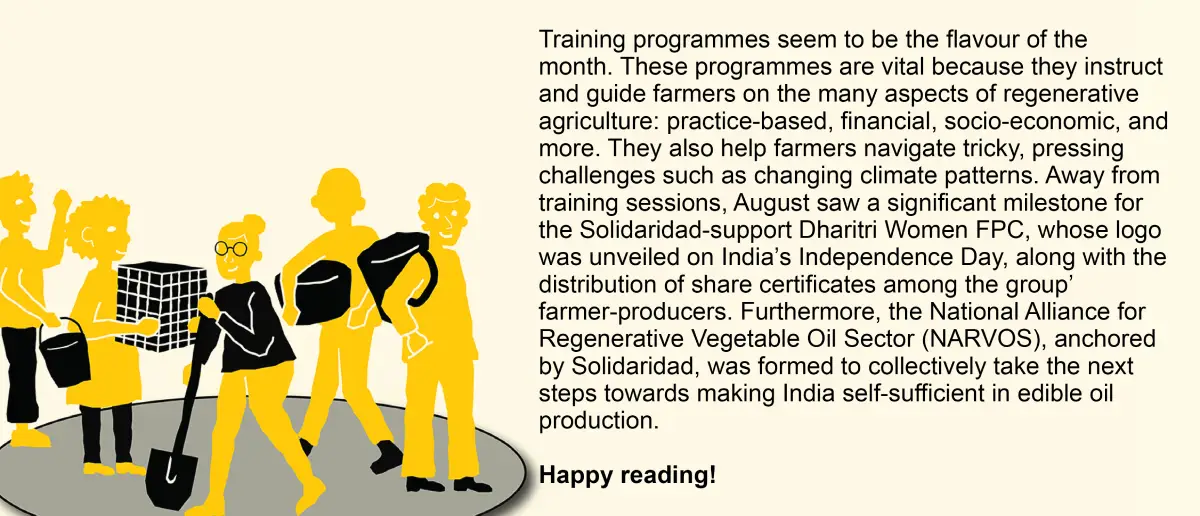

Building Bonds with Dharitri FPC Farmers and Stakeholders
Small-scale farmers, the board of directors and promoters of Dharitri Women Farmer Producer Company (DWFPC) gathered for an event at the Solidaridad–Sarat Kar and Anima Kar (SKAK) Foundation Centre of Excellence (CoE) on 15 August. At the event, Sobhan Kar (Chair, SKAK Foundation) unveiled the logo of DWFPC in the presence of Annpurna Moharana (Chairperson, DWFPC), members of DWFPC, and other dignitaries.
Dharitri came together in April 2025, and has seen good pace in mobilizing share capitals. More than 150 shareholders are now associated with the FPC. At the event, Sobhan and Annpurna distributed share certificates among the shareholders to reinforce the sense of ownership among farmer–producers and formally recognize their stake in and contribution to the group’s growth. Each certificate served as a symbol of trust, commitment, and partnership in building a stronger future for the farming community. While taking stock of the group’s progress, the session also laid emphasis on the need for capacity-building of members on value addition in dairy products, mushroom and rice.
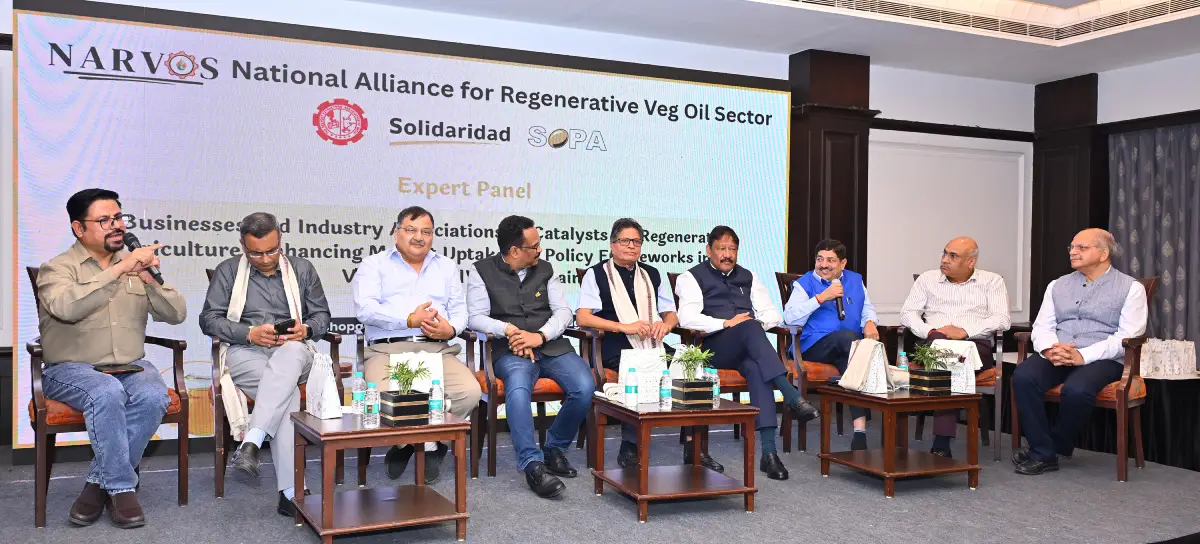
National Alliance for Regenerative Vegetable Oil Sector (NARVOS) Drives Efforts for Edible Oil Self-Sufficiency
In a landmark development for India’s edible oil sector, leading industry associations, research institutions, government bodies, and civil society organizations have recently come together in Bhopal to form the National Alliance for Regenerative Vegetable Oil Sector (NARVOS). Anchored by Solidaridad, NARVOS aims to drive large-scale adoption of regenerative agriculture, which restores soil health, boosts productivity, and strengthens farmers’ resilience to climate change. On this occasion, the Solvent Extractors’ Association of India (SEA), announced a commitment to buy back regenerative products along with its 800 member companies—demonstrating strong industry support for the transition.
The initiative, held as part of the Multistakeholder Meeting on Regenerative Agriculture and Sustainable Vegetable Oil under the EU–India partnership, is aimed at building climate-resilient food systems, strengthening sustainable value chains, and driving farmer-centric innovations. With active participation from SEA, The Soybean Processors Association of India (SOPA), AWL Agri Business, the Indian Institute of Soil Science (IISS), and several CSOs, the alliance marks a significant step towards reducing India’s edible oil import dependency, enhancing farmer livelihoods, and positioning the country as a global leader in sustainable vegetable oil production.
The event featured dynamic panel discussions on key themes, including the role of businesses and industry associations as catalysts for regenerative agriculture, contributions of CSOs, grassroots engagement and enabling policies, and advancing gender-inclusive supply chains and technologies.
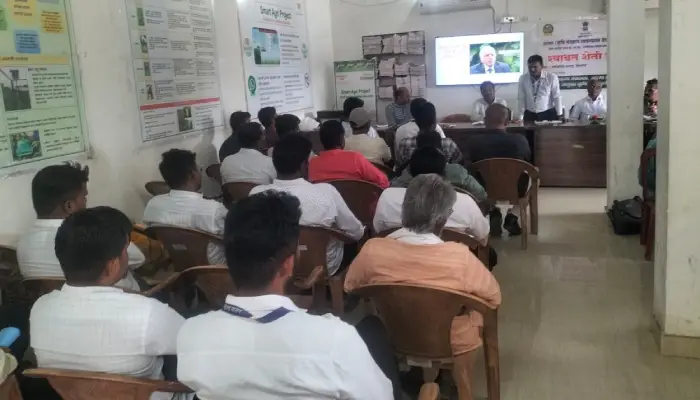
Importance of Soil Health, Water Management, and Regenerative Practices Highlighted during Sustainable Agriculture Day in Maharashtra
Recently, Maharashtra declared 7 August as Sustainable Agriculture Day to honour the legacy and contributions of the legendary agricultural scientist, Dr. M. S. Swaminathan.
On this occasion, our team in Maharashtra conducted a training programme at the Hinganghat Training Centre in Wardha district, in collaboration with the Agriculture Department. The event was also attended by the Agriculture Officer and the Assistant Agriculture Officer.
The officials guided farmers on sustainable farming practices, shared valuable insights on improving soil health and water management, and promoted the adoption of climate-resilient practices. The session aimed to equip farmers with practical knowledge and innovative practices that enhance productivity while protecting natural resources.
Key topics included the use of organic inputs, integrated pest management, and crop diversification to encourage healthier, more balanced farming methods. Farmers also received training on soil and water conservation techniques, such as soil health management, drip irrigation, and rainwater harvesting, ensuring efficient utilization of natural resources.The training also highlighted climate-resilient agriculture, instructing farmers on strategies for adapting to changing weather conditions and decreasing their reliance on chemical fertilizers.
Overall, the programme focused on enhancing farmers’ livelihoods by helping them improve crop yields, reduce input costs, and achieve better income through regenerative agricultural practices.
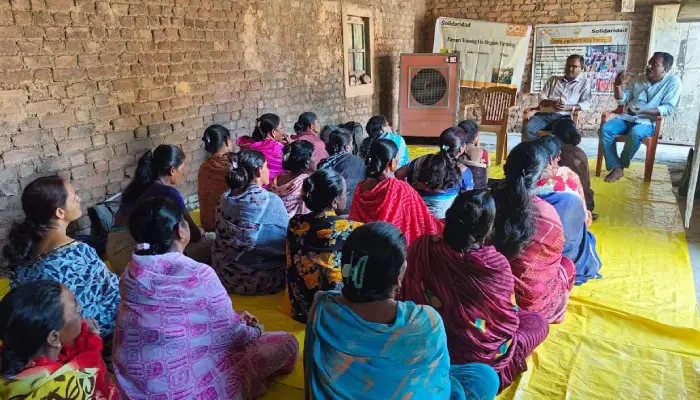
Women Receive Useful Training on Gender Equality, Decent Work, and Access to Finance
Providing equal opportunities for women farmers, and equipping them with the knowledge and resources needed to improve their livelihoods are necessary for them to contribute effectively to regenerative agriculture.
35 women participated in a recent training session on gender equality and decent work conducted by our team in Maharashtra in the Dhamangaon cluster of Amravati district. The session aimed to empower farmers, enhance their knowledge, and strengthen their roles in the agricultural sector.
Participants received useful information on occupational health and safety measures in cotton farming, the role of women in agriculture, and the various activities performed by women in cotton farming. The training also focused on livelihood sources and income-generating activities for women self-help groups. It also provided an overview of organic, smart, and regenerative agriculture projects to promote sustainable farming practices.
Furthermore, the farmers were guided on credit linkages and contract farming opportunities to improve their financial access and income.
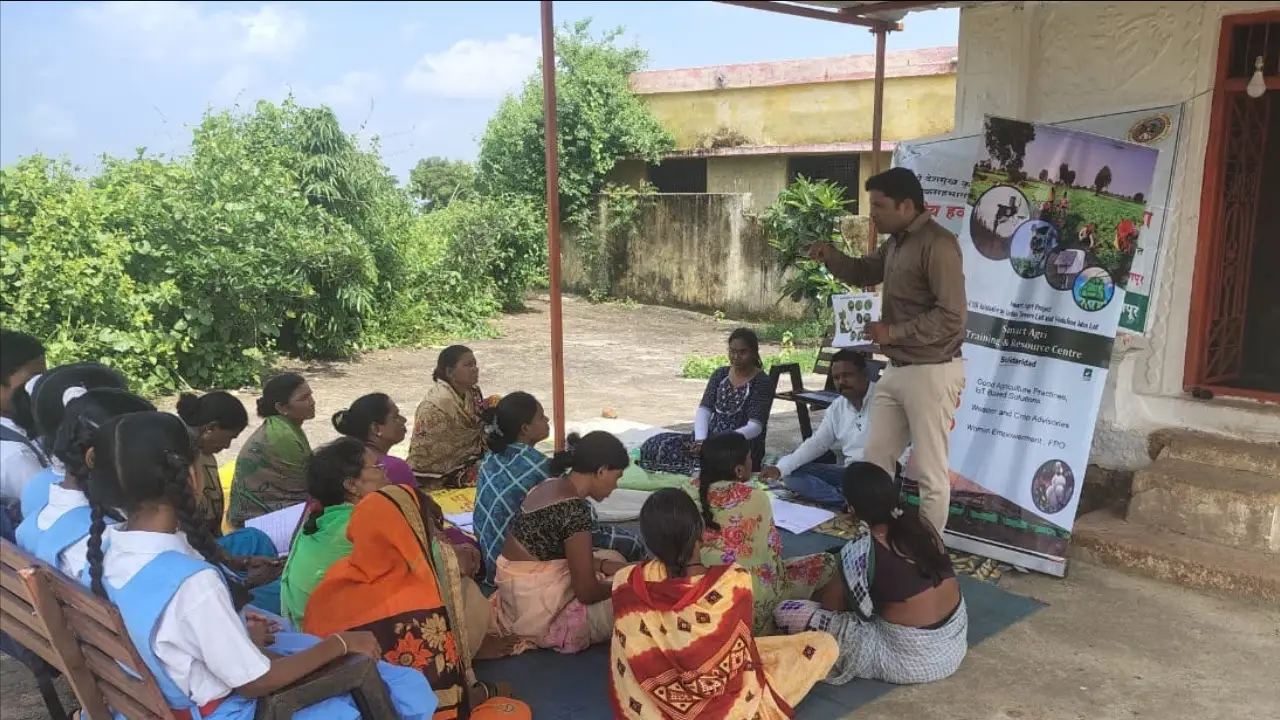
Climate Resilience and Pest Management Discussed at Farmers’ Training Session in Nagpur District
We recently conducted a farmers’ training session in Zhipli village, Kalmeshwar taluka in Maharashtra’s Nagpur district, focusing on building farmers’ capacities to prepare for, adapt to, and recover from the impacts of climate change. The training imparted practical knowledge on inter-cultural operations essential for kharif crops, and emphasized integrated nutrient management, a balanced approach to maintaining soil fertility and ensuring crop productivity by combining organic, inorganic, and biological sources of plant nutrients.
Farmers were also trained to identify harmful and beneficial pests, enabling them to adopt effective pest management strategies. The session covered plant-growth parameters, soil moisture availability, and other critical factors that affect crop health and yield.
Additionally, participants were guided on using the Smart Agri Advisory application, which provides helpful agri-advisories four times a week in both audio and text formats. These advisories include timely updates on weather conditions, temperature, and rainfall, helping farmers plan their farming activities more effectively and sustainably.
This training therefore aims to strengthen farmers’ resilience to climate variability while promoting regenerative agricultural practices.
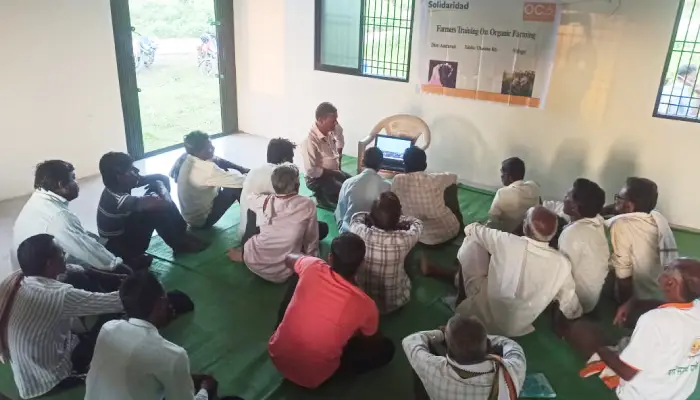
Cotton Sustainability Principles and Standards Explained to Farmers
Recently, we introduced small-scale farmers to Organic Cotton Accelerator (OCA) and the National Programme for Organic Production (NPOP) standards. The objective of the lesson was to raise awareness among farmers about organic farming practices and sustainable cotton production, while also enhancing their knowledge of improved agricultural practices.
During the session, several important topics were covered, including decent work and gender equality, occupational health and safety measures in cotton farming, and the importance of adopting OCA and NPOP standards for organic cotton certification. Farmers were also trained on crop diversification techniques such as mixed cropping, intercropping, and trap cropping (for effective insect and pest management).
Additionally, the training highlighted practices for protecting beneficial insects and conserving biodiversity, besides providing an overview of the OCA, Smart Agri, and Regenagri projects. Farmers gained practical knowledge on identifying major pests, understanding the nature of their damage, and applying appropriate control measures for sucking pests in cotton and white grub in cotton and soybean crops.
To support knowledge transfer, a video on crop diversification in cotton was shown, helping farmers better understand practical approaches to regenerative cotton farming.
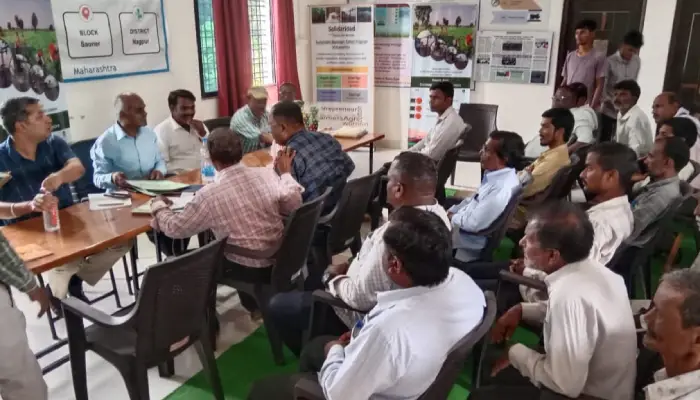
Farmers in Maharashtra Receive Detailed Guidance on Crop Insurance and Budgeting
On 6 August, Solidaridad partnered with the Agriculture Department to deliver an impactful training session on financial inclusion and good agricultural practices at the Borujwada Training Centre, Nagpur district. The programme sought to enhance farmers’ understanding of managing their finances effectively, improving access to banking services, and navigating government schemes.
Farmers gained practical skills to budget wisely, minimize financial risks, and make informed decisions to strengthen their economic stability. Emphasis was placed on encouraging the use of formal financial tools such as credit, savings, and insurance to open new opportunities for financial security.
A key highlight was the detailed guidance on crop insurance—educating farmers on the significance of protecting their crops from climate-induced damages, pest attacks, and diseases. Participants received instructions on registering for government schemes, understanding premium structures, and navigating claims processes.
Alongside financial topics, the training reinforced the importance of regenerative agriculture principles. Farmers were introduced to organic inputs, integrated nutrient and pest management, and crop diversification strategies aimed at enhancing soil health, conserving water, reducing costs, and boosting crop quality.
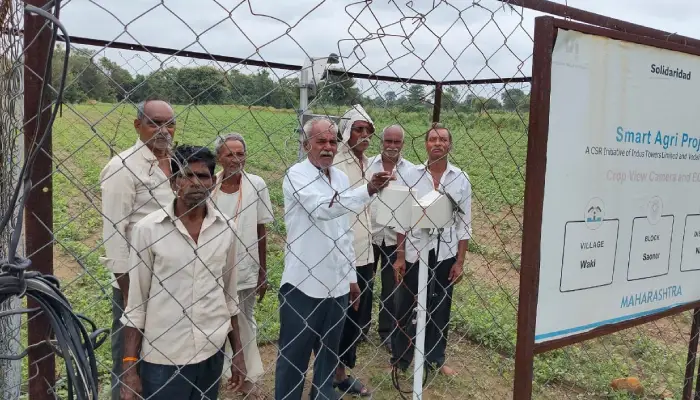
Farmers’ Workshop Demonstrates Proper Maintenance of Vital Agricultural Instruments
In early August, Solidaridad conducted an equipment maintenance and knowledge transfer-cum-capacity building workshop in Waki village, Saoner Block, Nagpur district. The training focused on explaining the importance of the equipment installed in the fields and helping farmers understand how these devices assist in preparing agricultural advisories and managing their farming activities more effectively.
The Solidaridad team guided farmers on the use and functions of the Crop View Camera, as well as the ECO D3 weather station and its sensors. These instruments enable farmers to take daily pictures of their crops, monitor crop growth and health, and provide valuable data on soil moisture, soil temperature, and electrical conductivity. Such information aids in developing agri-meteorological advisories, making farming activities easier and more efficient.
In addition, the training covered topics such as the Smart Agri Advisory application, inter-culture operations, integrated pest management, and nutrient management. This comprehensive approach helped farmers gain practical knowledge for optimizing their agricultural practices and improving overall farm productivity through smart technology and sustainable methods.
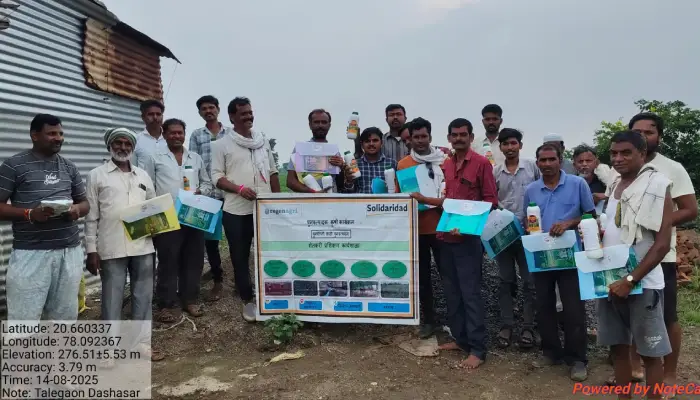
Field Training Programme Guides Farmers on Clime-Smart, Regenerative and Smart Agri Project Practices
In collaboration with the Department of Agriculture, Solidaridad recently organized a field training programme in Talegaon Dashasar village, Amravati district. The session focused on climate-smart regenerative farming, and practices recommended under the Smart Agri Project. The objective was to create awareness among farmers on improving soil health and promoting good agricultural practices.
During the programme, farmers were guided on the importance of soil health management and how adopting climate-smart agriculture can improve soil fertility, enhance crop resilience, and strengthen farm sustainability. Special emphasis was placed on techniques that help farmers build resilience against climate change while improving productivity.
To provide practical support, the Agriculture Department distributed Trichoderma viride and essential micronutrients to participating farmers. These inputs help farmers improve soil quality, manage soil-borne diseases, stimulate plant growth, and enhance overall crop yields. The officials from the department also shared their expertise on regenerative practices and government-supported initiatives.

Farmers’ Exposure Visit to Cotton Farm Yields Useful Insights
Farmers recently took part in an exposure to a field in Zhipli Village, Kalmeshwar Taluka, Nagpur district, managed under the Smart Agri Project. The inspection primarily focused on guiding farmers about diseases and pest infestations affecting cotton crops during this period, along with effective methods for their control and prevention.
The visit assessed the overall health and growth of the cotton crop by observing factors such as plant development, pest and disease infestation, and potential yield. Observations were recorded at different stages of crop growth (from seedling stage to the vegetative phase. Any issues requiring intervention, such as pest control or nutrient management, were identified and noted for timely action.
Recognizing the crucial role women play at different times—from sowing to harvesting—the visit emphasized the importance of their knowledge about field conditions. Empowering women with this understanding enables them to contribute effectively to better crop management and improved agricultural outcomes.
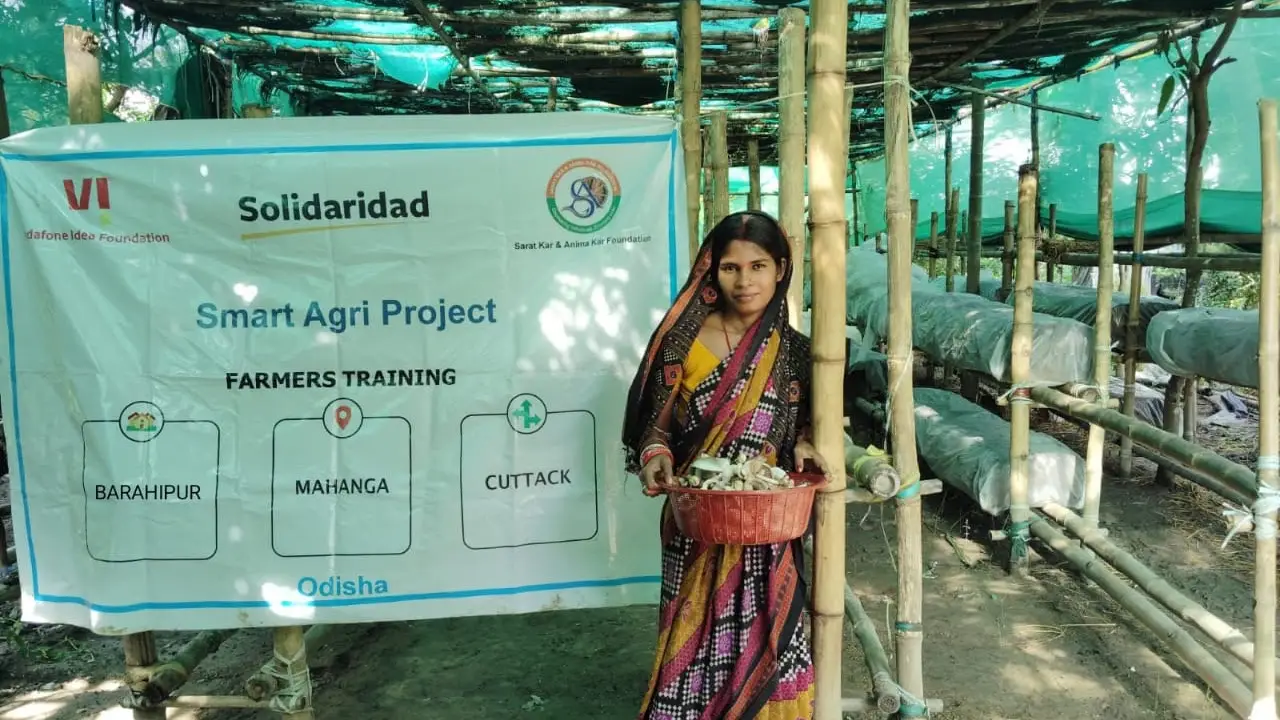
Urmila’s Mushrooming Success,
It was mushroom cultivation that provided a fresh breath of air in the life of Urmila Das, a resident of Barahipur village, Cuttack district, Odisha. Urmila supports her family of five from the proceeds of her 16 dismil (0.065 hectare)-large farm, but she could never use the land to its full potential because of a lack of knowledge and skill.
Mobilizers of the Smart Agri Project introduced her to mushroom cultivation, after which she participated in a training programme at the Solidaridad–SKAK Foundation Centre of Excellence in July 2024.
After receiving ₹35,000 from the state’s Horticulture Department and shade net for 300 mushroom beds, Urmila set up her own mushroom unit. After the first harvesting phase, she earned a profit of ₹7,000. The profit has since steadily increased due to her persistence—and now, she is earning a profit of ₹20,000 per month.
The improved earnings have helped Urmila become financially independent, and she is now able to manage her family’s expenses. It has also allowed her to evolve from a housewife with limited income-earning opportunities to a key decision-maker in household affairs. Buoyed by the success of her venture, Urmila intends to improve the infrastructure of her unit and add more beds.
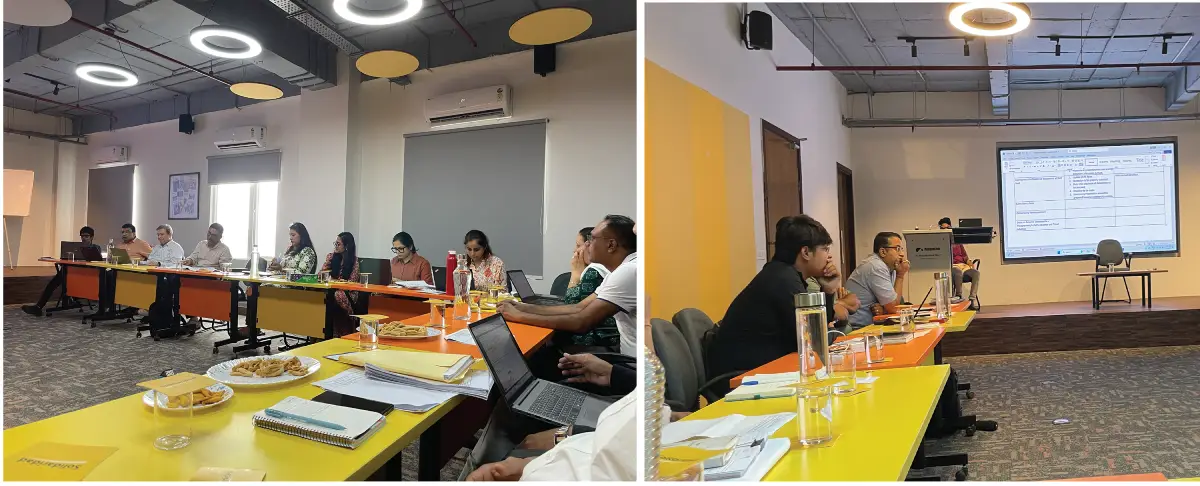
A two-day workshop was organized on 4–5 August 2025, bringing together Finance, HR, Procurement, and Admin staff from all project offices. The programme aimed to strengthen capacity building, enhance procurement processes, and streamline operational workflows.

Rupsa Banerjee joined us as Senior Programme Officer–Sustainable Palm Oil Programme on 1 August 2025. With a background in development consulting, Rupsa brings experience across programme management, policy research, and knowledge management. Rupsa is skilled in qualitative research, strategic communication and stakeholder engagement and is adept at synthesising insights into high-quality knowledge products. She holds an MSc in Development Studies and a BA in Economics (Hons.).
She was previously associated with Sattva Consulting, where she played a pivotal role in initiatives such as Project Sampoorna, an education program to promote SEL in Jharkhand, ONI's Urban Collective Action Network, and contributed to the strategy and policy advisory work for NITI Aayog’s State Support Mission. She was also involved in knowledge management in PCI as part of BMGF's Maternal and Child Health and Nutrition projects in UP and Bihar. Her work spans across thematic areas, including health, education, agriculture, sustainability, and urban development.